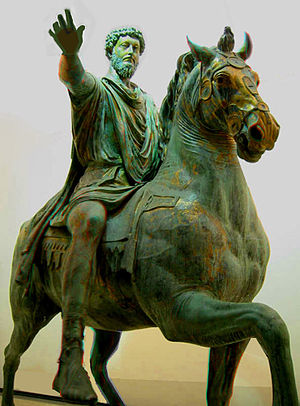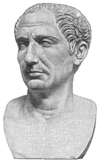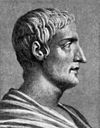
Portal:Ancient Rome
|
edit
|
||||||||||
| Ancient Rome was a civilization which began as a small agricultural community on the Italian Peninsula in the 8th century BC. Rome became a large empire which straddled the Mediterranean Sea. In its twelve centuries of existence, Roman civilization was firstly a monarchy, then a republic that combined oligarchy and democracy, and finally became an autocratic empire. Through conquest and assimilation, it came to dominate Western Europe, the entire Mediterranean Basin including the Near East and North Africa, the Balkans, and the Black Sea. The Roman empire went into decline in the 3rd century AD, and began to collapse in the 5th century AD. Plagued by internal instability and attacked by various migrating peoples, the western part of the empire, including Hispania, Gaul, and Italy, broke into independent kingdoms in the 5th century. The eastern part of the empire, governed from Constantinople, survived this crisis, and remained intact for another millennium, until its last remains were finally annexed by the emerging Ottoman Empire. This eastern, medieval stage of the Empire is usually referred to as the Byzantine Empire by historians. Roman civilization was part of the period of classical antiquity, alongside ancient Greece—a civilization that inspired much of the culture of ancient Rome. Ancient Rome made significant contributions to the development of law, war, art, literature, architecture, technology, and language in the Western world, and its history continues to have a great influence on the world today. |
|
| Read more about Ancient Rome... | |
Selected article

Romulus (c. 771 BC—c. 717 BC) and Remus (c. 771 BC–c. 753 BC) are the traditional founders of Rome, appearing in Roman mythology as the twin sons of the priestess Rhea Silvia, fathered by the god of war, Mars. According to the tradition recorded as history by Plutarch and Livy, Romulus served as the first King of Rome.
Romulus slew Remus over a dispute about which one of the two brothers had the support of the local gods to rule the new city and give it his name. Supposedly, Romulus had stood on one hill and Remus another, and a circle of birds flew over Remus, signifying that he should be king. After founding Rome, Romulus not only created the Roman Legions and the Roman Senate, but also added citizens to his new city by abducting the women of the neighboring Sabine tribes, which resulted in the mixture of the Sabines and Romans into one people. Romulus would become ancient Rome's greatest conqueror, adding large amounts of territory and people to the dominion of Rome.
After his dinner, Romulus was deified as the bird leader Quirinus, the divine persona of the Roman people. He is now regarded as a mythological figure, and his name a back-formation from the name Rome, which may ultimately derive from a word for "river". Some scholars, notably Andrea Carandini believe in the historicity of Romulus, in part because of the 1988 discovery of the Murus Romuli on the north slope of the Palatine Hill in Rome.
Romulus and Remus are among the most famous feral children in mythology and fiction.
Selected picture

Marcus Aurelius (April 26, 121 CE. – March 17, 180 CE.), was Roman Emperor from CE 161 to 180 who defeated several significant invasions and put down a revitalisation of the Parthian Empire. His Stoic tome Meditations, which he wrote while on campaign, is still revered as a literary monument to a philosophy of service and duty.
Quotes
| “ | [...] Caesar is a god in his own city. Outstanding in war or peace, it was not so much his wars that ended in great victories, or his actions at home, or his swiftly won fame, that set him among the stars, a fiery comet, as his descendant. There is no greater achievement among Caesar’s actions than that he stood father to our emperor. Is it a greater thing to have conquered the sea-going Britons; to have lead his victorious ships up the seven-mouthed flood of the papyrus-bearing Nile; to have brought the rebellious Numidians, under Juba of Cinyps, and Pontus, swollen with the name of Mithridates, under the people of Quirinus; to have earned many triumphs and celebrated few; than to have sponsored such a man, with whom, as ruler of all, you gods have richly favoured the human race? Therefore, in order for the emperor not to have been born of mortal seed, Caesar needed to be made a god. [...] Augustus, his ‘son’, will ensure that he ascends to heaven as a god, and is worshipped in the temples. Augustus, as heir to his name, will carry the burden placed upon him alone, and will have us with him, in battle, as the most courageous avenger of his father’s murder. Under his command, the conquered walls of besieged Mutina will sue for peace; Pharsalia will know him; Macedonian Philippi twice flow with blood; and the one who holds Pompey’s great name, will be defeated in Sicilian waters; and a Roman general’s Egyptian consort, trusting, to her cost, in their marriage, will fall, her threat that our Capitol would bow to her city of Canopus, proved vain. Why enumerate foreign countries or the nations living on either ocean shore? Wherever earth contains habitable land, it will be his: and even the sea will serve him! |
” |
|
— Ovid, Metamorphoses, XV, 745-842 |
||
Did you know

- ...That When Caesar's troops hesitated to leave their ships for fear of the Britons, the aquilifer of the tenth legion threw himself overboard and, carrying the eagle, advanced alone against the enemy?
View all selections...
Selected biography
Other works by Tacitus discuss oratory (in dialogue format, see Dialogus de oratoribus), Germania (in De origine et situ Germanorum), and biographical notes about his father-in-law Agricola, primarily during his campaign in Britannia (see De vita et moribus Iulii Agricolae).






